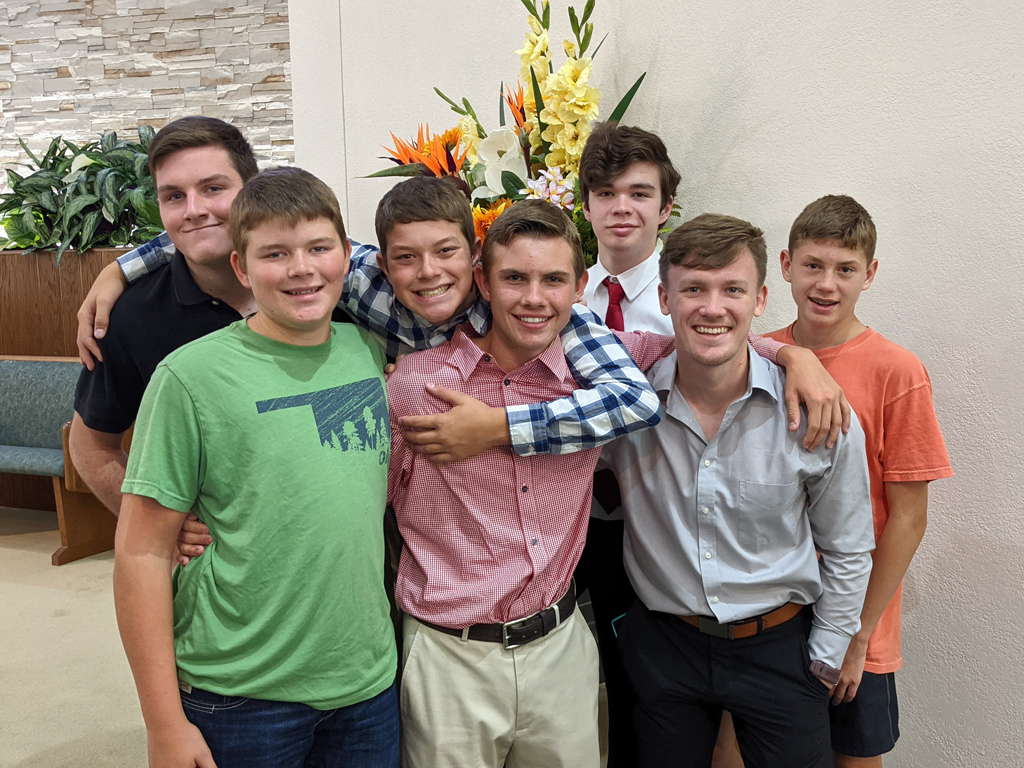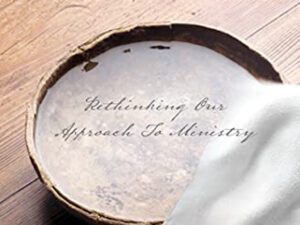Prayer and the Nature of God
 For those who have been part of the church for very long, there are probably people whose prayers you especially appreciate. During our years in Arkansas, I loved to see Charles Pittman step to the microphone to lead a prayer in the worship service. Mr. Pittman is a retired English professor, so it is no surprise that he has an eloquent way with words. More importantly, it is clear that he engages regularly in prayer. His words are those of someone very familiar with the One to whom he is speaking.
For those who have been part of the church for very long, there are probably people whose prayers you especially appreciate. During our years in Arkansas, I loved to see Charles Pittman step to the microphone to lead a prayer in the worship service. Mr. Pittman is a retired English professor, so it is no surprise that he has an eloquent way with words. More importantly, it is clear that he engages regularly in prayer. His words are those of someone very familiar with the One to whom he is speaking.“Prayer can have no meaning unless it takes into account God’s total nature. He is holy; we come to Him on those grounds. He is love; we pray knowing that He is concerned about our needs. Because He is merciful, God understands and cares about human need. In most of the prayers of biblical characters, God took the initiative. The greatest saints have always known intuitively, from the depths of their spiritual nature, that God desires to provide for His own. God has chosen to relate Himself to us as a loving Father. He is also shepherd, keeper, refuge and strength, a very present help in trouble (Ps. 46:1), and a sun and shield (Ps. 84:11).”
30 Days of Prayer
 On Sunday evenings during 2021, we have spent each month focusing on a different topic related to Christian living. In November, we will continue that pattern as we study about prayer. Although every day should be a day of prayer, I would encourage each of us to begin 30 days of prayer on Monday by praying about these specific topics each day during the month. – Brian
On Sunday evenings during 2021, we have spent each month focusing on a different topic related to Christian living. In November, we will continue that pattern as we study about prayer. Although every day should be a day of prayer, I would encourage each of us to begin 30 days of prayer on Monday by praying about these specific topics each day during the month. – Brian|
Date |
Prayer Focus |
|
Date |
Prayer Focus |
|
11/1 |
Southwest Church |
|
11/16 |
Our college students |
|
11/2 |
Our Nation |
|
11/17 |
Growing faith & Overcoming doubt |
|
11/3 |
Our Community |
|
11/18 |
The Church around the world |
|
11/4 |
Our Schools, Teachers, Staff, |
|
11/19 |
People in need |
|
11/5 |
Unity |
|
11/20 |
Wisdom |
|
11/6 |
People who are grieving |
|
11/21 |
Neighbors |
|
11/7 |
Opportunities to show love |
|
11/22 |
Difficult people and relationships |
|
11/8 |
God’s Glory |
|
11/23 |
Local outreach |
|
11/9 |
God’s Will |
|
11/24 |
Our need and ability to forgive |
|
11/10 |
Global Missions |
|
11/25 |
Thanksgiving for God’s Provision |
|
11/11 |
Veterans and Military |
|
11/26 |
Contentment |
|
11/12 |
Freedom from sin |
|
11/27 |
Stronger Marriages |
|
11/13 |
Widows and widowers |
|
11/28 |
Boldness to share the gospel |
|
11/14 |
Orphans |
|
11/29 |
Opportunities to serve |
|
11/15 |
Our families |
|
11/30 |
Perseverance |
“The prayer of a righteous person has great power as it is working.” – James 5:16b
Think About Yourself Instead of Others
 That title probably got your attention, because on the surface it sounds like the opposite of what we usually think about the teachings of Jesus. However, it is an idea that has been on my mind during Jet’s Wednesday night class about serving. It is easy for us to let our critical thoughts about others change our attitudes about serving them. Jet has been challenging us (most recently from 2 Corinthians 10) to consider how we think about serving. Maybe our thoughts about others actually begin with us.
That title probably got your attention, because on the surface it sounds like the opposite of what we usually think about the teachings of Jesus. However, it is an idea that has been on my mind during Jet’s Wednesday night class about serving. It is easy for us to let our critical thoughts about others change our attitudes about serving them. Jet has been challenging us (most recently from 2 Corinthians 10) to consider how we think about serving. Maybe our thoughts about others actually begin with us.People or Objects
 If you missed the final lesson of our summer series Wednesday night, you really missed out. Wayne Roberts shared and excellent lesson from John 9 that was summed up with the idea that if we want people to see Jesus in us, then we need to see people the way Jesus sees people. It sounded so simple when Wayne said it, but it might be one of our greatest challenges as Christians.
If you missed the final lesson of our summer series Wednesday night, you really missed out. Wayne Roberts shared and excellent lesson from John 9 that was summed up with the idea that if we want people to see Jesus in us, then we need to see people the way Jesus sees people. It sounded so simple when Wayne said it, but it might be one of our greatest challenges as Christians.“Whatever I might be ‘doing’ on the surface, I’m being one of two fundamental ways when I’m doing it. Either I’m seeing others straightforwardly as they are–as people like me who have needs and desires as legitimate as my own–or I’m not. One way, I experience myself as a person among people. The other way, I experience myself as the person among objects.”
To Tell the Truth
 The television show, To Tell The Truth, began airing in the mid 1950s and has experienced several reinventions through the years. It features three people who each claim to be a specific person with a talent, career or unusual identity. Celebrity panelists take turns asking questions before deciding which is the real person. Those claiming to be the true person are usually able to answer every question that comes their way. Some might think it’s amazing how well they are able to lie, but for many of us it’s something we see all too frequently in real life. It’s hard to know who to believe.
The television show, To Tell The Truth, began airing in the mid 1950s and has experienced several reinventions through the years. It features three people who each claim to be a specific person with a talent, career or unusual identity. Celebrity panelists take turns asking questions before deciding which is the real person. Those claiming to be the true person are usually able to answer every question that comes their way. Some might think it’s amazing how well they are able to lie, but for many of us it’s something we see all too frequently in real life. It’s hard to know who to believe.Back to School
 We are in the midst of an exciting for many families here at Southwest. Teachers and school staff are preparing classrooms and lessons. For some parents, you will be sending a child to school for that first day of kindergarten. For lots of our families, it’s another year of the annual cycle between summer vacations and the return to routine. Some will be taking that first day of school picture for the last time as kids enter their senior year. We have college students heading to Ada while others will say goodbye to kids who are heading off to college. In life we are continually growing. Throughout scripture we see stories of people who grow in their faith, and we are given instruction and examples along the way to learn how to grow ourselves. There is a good foundation for our growth and learning in Deuteronomy 6:4-9.
We are in the midst of an exciting for many families here at Southwest. Teachers and school staff are preparing classrooms and lessons. For some parents, you will be sending a child to school for that first day of kindergarten. For lots of our families, it’s another year of the annual cycle between summer vacations and the return to routine. Some will be taking that first day of school picture for the last time as kids enter their senior year. We have college students heading to Ada while others will say goodbye to kids who are heading off to college. In life we are continually growing. Throughout scripture we see stories of people who grow in their faith, and we are given instruction and examples along the way to learn how to grow ourselves. There is a good foundation for our growth and learning in Deuteronomy 6:4-9.Preacher Training Camp 2021

This Sunday they will share their lessons from camp with us. Come and be encouraged and challenged by their thoughts from God’s word.
VBS 2021
 As I write this, our Vacation Bible School is about to begin. At least the part the kids see is about to begin. There has already been a lot of work planning, decorating and preparing. Right now there are people in the kitchen getting a meal ready. VBS was another thing that we missed out on in 2020, and it is encouraging to see its return. If you are reading this on Sunday, VBS is finished and the building is probably back to normal. Although I’ll have to admit that I wouldn’t mind if there was a boat on the stage and a whale (or big fish) in the hallway for a little longer.
As I write this, our Vacation Bible School is about to begin. At least the part the kids see is about to begin. There has already been a lot of work planning, decorating and preparing. Right now there are people in the kitchen getting a meal ready. VBS was another thing that we missed out on in 2020, and it is encouraging to see its return. If you are reading this on Sunday, VBS is finished and the building is probably back to normal. Although I’ll have to admit that I wouldn’t mind if there was a boat on the stage and a whale (or big fish) in the hallway for a little longer.
The story of Jonah is another of those Old Testament stories that seems like it’s for kids because there are sailors, a ship, adventure and a whale (big fish). There is actually a lot in the story for us adults too. There are ungodly sailors who turn toward God, there’s an evil city that turns around and a reluctant preacher that turns bitter. Through it all the constant is God and his love for all of them. It’s always good to be reminded of God’s love and mercy for the sailors, the city, the preacher and us.
So thank you to everyone who helped make this year’s VBS possible. God wants His message proclaimed in our city as well, and you were a part of doing that this week.
Brian
“When God saw what they did, how they turned from their evil way, God relented of the disaster that he had said he would do to them, and he did not do it.” – Jonah 3:10
Making the Invitation Inviting
 I have been reading a chapter of Mike Ireland’s book, The Gift of Ministry, each morning in the office. Each chapter is about four pages and has some practical encouragement or ideas about life as a minister. Last week one of the topics dealt with our tradition of having an invitation near the end of our services.
I have been reading a chapter of Mike Ireland’s book, The Gift of Ministry, each morning in the office. Each chapter is about four pages and has some practical encouragement or ideas about life as a minister. Last week one of the topics dealt with our tradition of having an invitation near the end of our services.Give Me Liberty
 Since it is the fourth of July weekend, you might have already finished the rest of that phrase in your mind: “or give me death.” Those defiant words of Patrick Henry helped shape a nation and its leaders. As much as we value liberty in our country, we are even more thankful for the liberty that God gives. In our study of the book of James both last week and this week, James mentions the “law of liberty.” God offers us freedom from sin and death, but that freedom was never intended to create an “anything goes” way of life. In the midst of that discussion of liberty, James emphasizes the importance of our actions matching our beliefs. He reminds us that our actions toward others are incredibly important in the eyes of the God who frees us.
Since it is the fourth of July weekend, you might have already finished the rest of that phrase in your mind: “or give me death.” Those defiant words of Patrick Henry helped shape a nation and its leaders. As much as we value liberty in our country, we are even more thankful for the liberty that God gives. In our study of the book of James both last week and this week, James mentions the “law of liberty.” God offers us freedom from sin and death, but that freedom was never intended to create an “anything goes” way of life. In the midst of that discussion of liberty, James emphasizes the importance of our actions matching our beliefs. He reminds us that our actions toward others are incredibly important in the eyes of the God who frees us.
